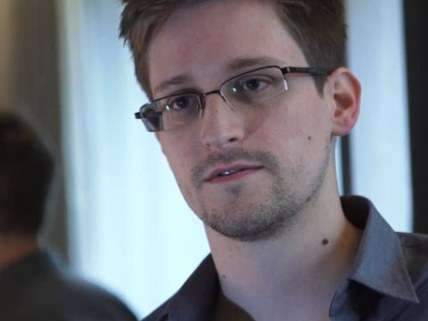Edward Snowden: NSA Too Busy Spying on Americans To Catch Terrorists

In testimony published last week by the European Parliament's Committee on Civil Liberties, Justice, and Home Affairs, NSA snooping whistleblower Edward Snowden told lawmakers that mass spying has proven to be an especially ineffective means of deterring wrongdoing. NSA claims to have prevented multiple terrorist attacks evaporate upon actual scrutiny. Worse, he says, the NSA is so busy probing the general public's gaming habits and personal communications that it has no time or resources to devote to anything useful—like stopping terrorists.
According to Snowden (PDF):
The first principle any inquiry must take into account is that despite extraordinary political pressure to do so, no western government has been able to present evidence showing that such programs are necessary. In the United States, the heads of our spying services once claimed that 54 terrorist attacks had been stopped by mass surveillance, but two independent White House reviews with access to the classified evidence on which this claim was founded concluded it was untrue, as did a Federal Court.
Looking at the US government's reports here is valuable. The most recent of these investigations, performed by the White House's Privacy and Civil Liberties Oversight Board, determined that the mass surveillance program investigated was not only ineffective--they found it had never stopped even a single imminent terrorist attack--but that it had no basis in law.
Specifically, the board concluded, "we have not identified a single instance involving a threat to the United States in which the program made a concrete difference in the outcome of a counterterrorism investigation."
When it comes to legal concerns, the board noted "There are four grounds upon which we find that the telephone records program fails to comply with Section 215," that "the program violates the Electronic Communications Privacy Act," and that "The NSA's telephone records program also raises concerns under both the First and Fourth Amendments to the United States Constitution."
The board's report also cautioned, "the bulk collection of telephone records can be expected to have a chilling effect on the free exercise of speech and association, because individuals and groups engaged in sensitive or controversial work have less reason to trust in the confidentiality of their relationships as revealed by their calling patterns."
Needless to say, the White House glibly rejected the Privacy and Civil Liberties Oversight Board's conclusions.
Snowden went on to point out the failings of the NSA's all-you-can-hoover approach to surveillance.
I believe that suspicionless surveillance not only fails to make us safe, but it actually makes us less safe. By squandering precious, limited resources on "collecting it all," we end up with more analysts trying to make sense of harmless political dissent and fewer investigators running down real leads. I believe investing in mass surveillance at the expense of traditional, proven methods can cost lives, and history has shown my concerns are justified.
Despite the extraordinary intrusions of the NSA and EU national governments into private communications world-wide, Umar Farouk Abdulmutallab, the "Underwear Bomber," was allowed to board an airplane traveling from Europe to the United States in 2009. The 290 persons on board were not saved by mass surveillance, but by his own incompetence, when he failed to detonate the device. While even Mutallab's own father warned the US government he was dangerous in November 2009, our resources were tied up monitoring online games and tapping German ministers. That extraordinary tip-off didn't get Mutallab a dedicated US investigator. All we gave him was a US visa.
Nor did the US government's comprehensive monitoring of Americans at home stop the Boston Bombers. Despite the Russians specifically warning us about Tamerlan Tsarnaev, the FBI couldn't do more than a cursory investigation--although they did plenty of worthless computer-based searching--and failed to discover the plot. 264 people were injured, and 3 died. The resources that could have paid for a real investigation had been spent on monitoring the call records of everyone in America.
Snowden's testimony also ranged over disclosures to come, and the complicity of European spy agencies in snooping on each other's citizens—and then sharing the data with the NSA, which gets the full package. Countries even modify their privacy laws to make the NSA's job (and that of their own agencies) easier.
All of this, to suck up more data than the spies can process, at the expense of targeting real threats.


Show Comments (68)